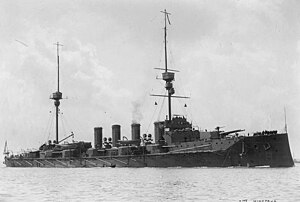 Minotaur at anchor, shortly after she was completed
| |
| Class overview | |
|---|---|
| Name | Minotaur-class cruiser |
| Operators | |
| Preceded by | Warrior class |
| Succeeded by | None |
| Built | 1905–1909 |
| In commission | 1908–1919 |
| Planned | 4 |
| Completed | 3 |
| Cancelled | 1 |
| Lost | 1 |
| Scrapped | 2 |
| General characteristics | |
| Type | Armoured cruiser |
| Displacement | 14,600 long tons (14,800 t) |
| Length | |
| Beam | 74.5 ft (22.7 m) |
| Draught | 26 ft (7.9 m) |
| Installed power |
|
| Propulsion | 2 shafts; 2 triple-expansion steam engines |
| Speed | 23 knots (43 km/h; 26 mph) |
| Range | 8,150 nmi (15,090 km; 9,380 mi) at 10 knots (19 km/h; 12 mph) |
| Complement | 802 |
| Armament |
|
| Armour |
|
The Minotaur class was a three-ship class of armoured cruisers built in the first decade of the twentieth century for the Royal Navy. These were the last class of armoured cruisers built for the Royal Navy, with that role being substantially replaced by the first battlecruisers. These initially served with the Home Fleet, generally as the flagships of cruiser squadrons. Minotaur became flagship of the China Station in 1910 and Defence served as flagship of the 1st Cruiser Squadron in the Mediterranean from 1912; Shannon remained at home as flagship of several different squadrons.
When World War I began in August 1914, Defence participated in the pursuit of the German ships SMS Goeben and SMS Breslau and Minotaur hunted for the German East Asia Squadron and German commerce raiders in the Pacific and Indian Oceans. Shannon remained with the Grand Fleet, as the Home Fleet was renamed, for the entire war. All three were present at the Battle of Jutland in May 1916, where Defence was sunk with the loss of all men on board. The surviving pair spent most of the rest of the war assigned to the Northern Patrol unsuccessfully searching for German warships and commerce raiders. The pair were scrapped after the war.
Cite error: There are <ref group=Note> tags on this page, but the references will not show without a {{reflist|group=Note}} template (see the help page).